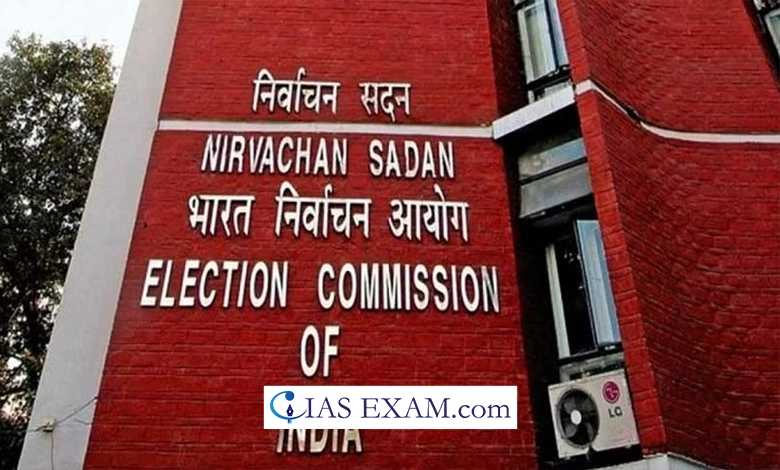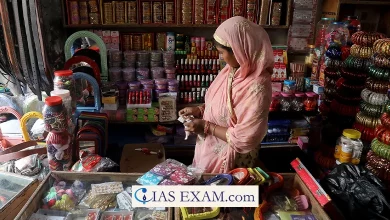Winning Elections Unopposed: Questioning the Polls
GS Paper 2 - Constitutional Bodies, Transparency & Accountability

Context
Recently, the candidate from the ruling party from Surat LS Constituency was declared elected unopposed. This occurs when all other candidates withdraw their nominations or are disqualified, leaving only one candidate in the running. When this occurs, a single candidate is proclaimed the winner without requiring a formal election. In this situation, there is a winner but no ‘vanquished’ party.
Getting elected unopposed is perfectly in the existing provisions of electoral laws and practices. One emerges as the unrivaled representative of the people despite the fact that he or she is the sole choice on the ballot. It’s like doing something without putting in the necessary effort.
Current Issues
- Opposition to Opposite Party’s Candidate’s Nomination: In the present case, the candidate of the opposition party for the Surat constituency, had filed three sets of nomination papers. The proposers for these three nomination papers were his brother-in-law, nephew, and business partner. A ruling party’s worker objected to the opposite candidate’s nomination alleging that the signatures of his proposers were not genuine.
- Rejection of the Nomination Papers: The RO also received affidavits from the proposers claiming that they had not signed the nomination papers of the candidate. Reply/Clarification was sought from the candidate within a day on the objections raised. As the proposers could not be produced before the RO within the stipulated time for scrutiny, all three sets of nomination papers were rejected.
- Nomination Papers of Others Also Rejected: The election rules allow for a substitute candidate to be fielded by a political party. The nomination of this substitute candidate would be accepted if the nomination of the original candidate is rejected. In this case, the opposition party had fielded its substitute candidate. However, the nomination paper of the substitute candidate was also rejected for the same reason, that is of the proposer’s signature not being genuine. The other nominations were either rejected or withdrawn paving the way for the ruling party’s candidate to be declared winner.
Laws for Nomination in India
- Section 33 of RPA, 1951 – Section 33 of the Representation of the People Act, 1951 (RP Act) contains the requirements for a valid nomination. As per the RP Act, an elector above 25 years of age can contest Lok Sabha election from any constituency in India.
- Proposers for Recognised Political Parties: –The proposer(s) of the candidate should however be elector(s) from that respective constituency where the nomination is being filed. In case of a recognised party (national or State), the candidate needs to have one proposer.
- Proposers for Unrecognized Political Parties – Candidates set up by unrecognized parties and independents need to be subscribed by ten proposers. A candidate can file up to four nomination papers with different sets of proposers. This is to enable the acceptance of nomination of a candidate even if one set of nomination papers is in order.
- Scrutiny of Nomination Papers – Section 36 of the RP Act sets out the law with respect to the scrutiny of nomination papers by the Returning Officer (RO). It provides that the RO shall not reject any nomination for a defect that is not of a substantial character. However, it specifies that the signature of the candidate or proposer found not genuine is grounds for rejection.
Challenges with Unopposed Election of Candidates
- Concerns for NOTA Voters: The question being raised is that this process does not allow electors to exercise the None of the Above (NOTA) option. The NOTA option was not originally provided for in law but incorporated on court directions to ‘enlighten’ political parties and candidates about what some people thought of them.
- Learnings from the General Financial Rules (GFRs): General Financial Rules (GFRs), which is a compilation of rules and orders of Government of India to be followed by all while dealing with matters involving public finances speak about “a fair, transparent and reasonable procedure” for public procurement.
- Undermining the Relevance of Voters: In a sense, the “elector” (defined in the RPA as “a person whose name is entered in the electoral roll of that constituency for the time being in force and who is not subject to any of the disqualifications”) is completely excluded from the process of choosing his representative.
- Assessing the Extreme Situation: In an extreme situation, all the candidates in 543 parliamentary constituencies (even if they are 10,000 representing different political parties or independents) could game the system and deny a billion electors their statutory right by complying with the process but seriously wounding the spirit of democracy.
- Ambiguous Provision Under Section 65, RP Act, 1951: The system is weighed in favor of the contesting candidates because the RPA provides that a complete boycott will be treated as everyone receiving zero vote and covered under Section 65 which deals with ‘Equality of votes’.
Way Forward
Ensuring a fair and transparent electoral process in India is critical for sustaining democratic norms, which is undermined when candidates are proclaimed elected without opposition. India may aim for elections free of malpractice and manipulation by establishing thorough legal frameworks, strong institutions, and encouraging active citizen engagement. Maintaining the integrity of the election process requires collaboration from all stakeholders, including political parties, electoral authority, and the courts. By sustaining the ideals of justice, openness, and accountability, India can enhance its democratic basis and guarantee that the people’s voice remains at the heart of governance.
SOURCE: The Hindu





.png)



